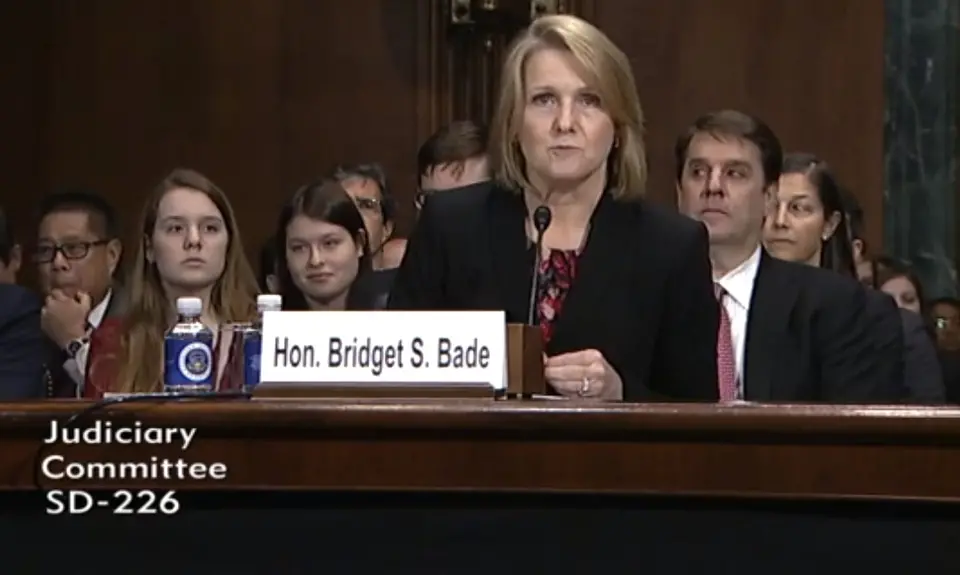“Confirmed Judges, Confirmed Fears” is a blog series documenting the harmful impact of President Trump’s judges on Americans’ rights and liberties. Cases in the series can be found by issue and by judge at this link.
Trump Ninth Circuit judge Bridget Bade reversed a district court decision that ruled that the conviction of a man was improper because he received ineffective assistance of counsel as a result of a clear conflict of interest. The July 2021 decision was in Noguera v Davis.
In 1983, William Noguera, who was just over 18 and had no prior convictions, was arrested, convicted, and sentenced to death in connection with the killing of his girlfriend’s mother. In considering a petition for post-conviction relief, a federal district judge found clear evidence that Noguera received constitutionally defective assistance of counsel, both at trial and the penalty phase, due primarily to his attorney Lorenzo Pereyda’s serious conflicts of interest. Specifically, Noguera’s mother hired and paid for Pereyda, who had represented her in divorce proceedings, to represent Noguera and, as she later admitted, instructed Pereyda “not to bring out” any “family problems or anything about Billy which would embarrass” her, and he agreed.
Accordingly, with respect to both the guilt and the penalty phase, Pereyda did not investigate or bring out anything relating to Noguera’s mental health, substance abuse, or possible abuse as a child. He also did not explore the issue of motive or consider a plea bargain, which would have required Noguera to admit to some involvement in the killing. Although the state supreme court had previously rejected Noguera’s claims, the federal district court found that “[c]learly, Mr. Pereyda could not simultaneously act in the best interests of both clients” – Noguera and his mother – and that Noguera accordingly received constitutionally ineffective assistance of counsel at both the guilt and penalty phases of his trial. The state appealed to the Ninth Circuit.
Although all three judges agreed with the district court as to the penalty phase, Trump judge Bade wrote a 2-1 decision that reversed the district court’s holding at the guilt phase of Noguera’s trial, so that his conviction will stand. Bade maintained that there was “no evidence” that was sufficient to show that the conflicts of interest involving his mother “adversely affected” Noguera’s representation, primarily because an affidavit by Pereyda “did not connect” the defense strategy decisions that even he admitted were questionable to the conflict of interest and the influence of Noguera’s mother. The state court decision to reject Noguera’s claims was thus “not unreasonable,” Bade concluded, and his conviction should stand.
Chief Judge Sidney Thomas firmly dissented, concluding that the record was clear that Pereyda’s “actual conflict of interest” in fact “adversely affected his performance” so that Noguera got “constitutionally ineffective assistance” of counsel at the guilt phase. Thomas recounted that the Supreme Court has clearly held that this is true where “basic strategy” decisions of a lawyer are “influenced” by the third party “who hired him.” He recited in detail the facts summarized above that show that Pereyda’s performance was “adversely affected” by the conflict because he “did not pursue plausible alternative strategies that would have revealed embarrassing information” about Noguera’s mother and her family, as she instructed. There is no requirement that an attorney like Pereyda must specifically admit that a conflict of interest adversely affected his representation, and Thomas explained that the record, including statements by Nogeura’s mother, proved that it did. In fact, Thomas pointed out, “[n]o part” of Pereyda’s affidavit “conflicts” with the mother’s clear statements that she made sure that Pereyda would not pursue any defenses that could embarrass her or her family, and Pereyda did state that “none of his strategic decisions” were based on any experience or knowledge about litigation in cases involving a possible death penalty, and this was in fact Pereyda’s “first capital case.”
As Thomas wrote, this case “demonstrates how a conflict of interest can permeate an entire representation” and “result in serious errors” that “bleed into both the guilt and he penalty phases of a capital trial.” As a result of Trump judge Bade’s decision, however, although William Noguera will receive a new hearing on whether he should be put to death, his conviction and extended imprisonment will stand despite the ineffective assistance of counsel he received due to a conflict of interest. The case is yet another example of Trump judges failing to respect and enforce the constitutional right to effective assistance of counsel in criminal cases, and illustrates the importance of President Biden nominating and the Senate confirming judges who will respect that important right.
